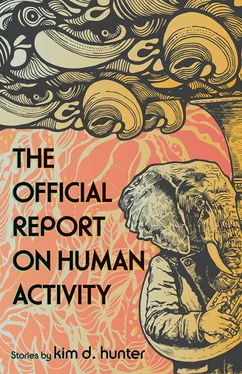Whenever she tried to focus on creating a story that could sell and, thereby, lift them from the poverty that seemed otherwise certain, she drifted inexorably to thinking about ways to get back to where she and the Scientist had been when he had taken over the interview. Time was not on her side, but she could not help returning to videos with discussions about modifications one could make that would recapture what had been lost in a relationship or that would at least alter your perception of the other person in your relationship.
Naturally, some of these modifications were failures. The Author stumbled upon a piece from an anonymous woman who claimed that she had been a singing star, that screeners would recognize her singing voice even coming from a cheap device.
This singing star had tried to alter her perception of her husband, who happened to be in business with her. She had gotten into the habit of perception-alterations because her husband was abusive, so abusive, in fact, that he had forbidden her to change the way she perceived him. In short, he wanted her to be fully and utterly aware of what he was doing, who was “in charge.”
None of this was apparent to the fan base or even the patrons. The singer noted the pain and solace she experienced from the isolation of her private life and the exhilaration of her “stage” life, seeing people go wild over the group’s holograms with her voice and image at the tip of the spear.
Somehow, she managed to get away long enough to get to a clinic where she could have the alterations to her perceptions done. It was doubly difficult to find a place that would be discreet. The “bad” publicity would have added to their fan base, but it would also have made her personal life worse. Things got worse anyway.
Perhaps the practitioners were quacks. Perhaps the sort of alterations she sought didn’t really exist. Whatever the case, her perceptions of her husband were in no way softened by the alterations, but rather intensified. His jokes about her looks, her “mistakes” during the act, how she owed all of her fame to his management—all of these things seemed both more petty and more vicious. Worse, she could feel the threats coming, sometimes long before he actually spoke. This sensitivity gave time a hallucinatory feel that made it drag and yet, somehow, seemed to shorten the periods between insults and threats.
Her reaction, fueled by the feelings of disappointment and betrayal, was a disgust she could not hide. He took it as a sign of defiance and became more violent until the physical alterations wouldn’t hold and, finally, her voice failed her. The Author had found her story.
There was a woman who loved to sing and dance whose parents left her to grow up with her grandmother in a quiet town where her singing and dancing drew attention, good and bad. People who liked and disliked the dancing said it reminded them of what they’d seen and heard or what other people had said they’d seen and heard in the much bigger city of Strummale, or Mailstrumville, depending on how you pronounce it, where things were much wilder.
The woman made plans to leave for the bigger city. Perhaps she would find fame and fortune there. Perhaps one of her parents would show up and she could ask where the hell they’d been. The grandmother was lukewarm on the woman going to the city. She thought the woman had extraordinary talent but also knew show business was a tough nut to crack.
The grandmother had in fact once tried to make it singing and dancing and had ended up being the “Singing Weather Girl,” on local radio, and then the “All Singing, All Dancing Weather Girl,” on the old screens you could hold or set on the table. She was a bit stiff and hoarse from all the singing and dancing, but the grandmother still paid what some would call an inordinate amount of attention to weather patterns and forecast and had taken to warning people whenever she could about how the temperature of the planet was rising and the problems that would follow as night follows day.
But, every time she brought it up, the older people couldn’t help but remember how beautiful her voice had been on the radio and screen, and the content of what she said was crowded out by their memories. The younger people who had no knowledge or memory of radios or the earlier plain, flat, external screens were confused by the dissonance between the memories as described by others and what the Grandmother said. Thus the content of her warnings sank like a stone in the ocean at night.
The woman as a girl was the only person who ever really heard what the Grandmother said, and even that was for a particular and short-lived time. They talked about simple things when the woman was younger and deeper things as she grew.
When the Girl had been very young, the Grandmother would sing and recite things she had learned from her father who had learned the songs from his great-great grandfather who had been a Gandy Dancer, back in the days when transports ran on tracks.
Up and down the road I go
Skippin’ and a dodgin’ forty fo’
Hey man, can’t you line it
Hey man, won’t you line it
The Girl laughed herself silly and it took awhile for the Grandmother to realize that the mere sound of her voice in recitation was what caused the infant to laugh. By the time the Girl learned to speak, she and the Grandmother sang.
If you were lost to me would I cry
Enough to roll the deepest river
Drown a mountain in the sky
As the Girl grew, she learned that everyone has a mother and father and began to ask about hers. Why weren’t they around? The Grandmother had no good answers or produced different slices of answers for the same question no matter how many times it was asked. The parents had to go away. They didn’t get along. They had only small things in common. They broke up shortly after the Girl was born. They were singers whose voices brought them together and then took them in opposite directions when money entered the equation.
This frustrated the Girl. The Grandmother would begin singing when she saw the Girl’s frustration, singing deeper, singing as though the Girl was not there or not there alone but listening along with the whole world, and the presence or seeming presence of so many enraptured souls soothed the Girl’s frustration and made the grandmother’s voice seem like the biggest, softest place that could ever be.
On the day the woman was scheduled to leave for the big city, the Grandmother became aware of an approaching storm and begged the woman to stay and ride it out in the shelter she and her now dead partner had built. The woman almost relented. But her bags were packed and it was a gorgeous, though amazingly humid, day and the thought of riding the transport in air-conditioned comfort (her grandmother had air conditioning but rarely used it and never set it any lower than 80 Fahrenheit) proved too big a temptation, and so the woman took off.
The storm didn’t strike as you might have expected, at the point in the story where the woman got on the transport and was waving goodbye to her sadly quiet Grandmother who sang to her even though she could not be heard through the transport glass and certainly thought it would be the last time she’d see her granddaughter. The storm did hit just as the woman reached Strummale or Mailstrumville.
She was dismayed and confused to see huge swaths of vacant land and half repaired damage all over the city from what must have been previous storms as she gazed out the transport window. The past and present storms merged in her mind with the rubble and the half repairs.
Thunder rattled windows and shook the ground. Multiple bolts of lightning struck near and far and the already nervous driver leapt screaming from the vehicle as it plunged into a crater that may have been a sinkhole or the site of a controlled exploded ordinance or the basement of a very small illegally constructed building. Whatever it was, it was big enough to consume the entire section of transport with the rest of the people who were going to, near, or past the cheap hotel she had booked for herself.
Читать дальше












